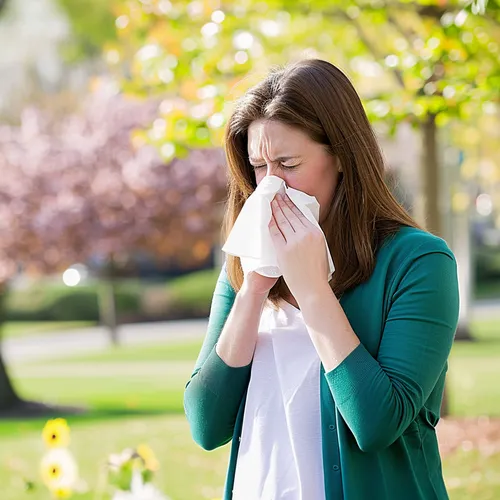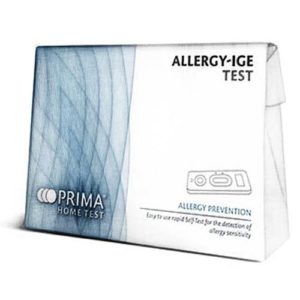Allergies – All the Facts
An allergy is defined as a disorder of the immune system which flares up and causes an exaggerated response from the body upon contact with a specific foreign substance. Most allergies are generally benign. The contact can be something you make with your mouth, skin, stomach, intestine, lungs or the oesophagus.
The foreign substances present in the environment that cause the allergic responses are called allergens. Being allergic to a particular allergen can cause one to sneeze or cough, in which case, it is pretty harmless; or it could lead to something more severe, even death.
Almost every substance on the planet can be an allergen to someone. Allergies are the body’s way of getting rid of something that it considers to be completely unsuitable. Allergies should not be taken lightly, as they can cause several illnesses, especially in small children, who are far less resistant to them.
In the UK, the number of people with allergies has risen dramatically over the last decade or so. It is believed that 1 in 3 people in the UK at some point in their lives suffer from an allergy. Over 9 million suffer from hay fever and 20 percent of the school children in the UK are affected by asthma. Over 6 million people in the UK have eczema.
If you think you have an allergy or your child has one, you must visit a doctor immediately, so that a solution can be found to control the allergic symptoms.
Allergies – Causes
Allergies are said to occur when a particular allergen triggers an uncontrollable reaction in the body. When an allergen comes into contact with the body, it puts the immune system on an alert. Since the immune system believes that allergen is harmful to the body, it produces an antibody called IgE (or E-class Immunoglobin) in order to fight it. Once this antibody is produced, it triggers the release of chemicals called histamine from the cells of the skin, lungs, nose or intestine, leading to various allergic symptoms.
Here’s a list of the most common allergens….
- House Dust Mites – House dust mites are one of the most common allergens responsible for breathing problems such as asthma or mild to severe skin irritations. They flourish in warm and humid conditions in most houses. Beds are an ideal breeding ground for them and a single mattress can contain millions of mites. An Allergy Test Kit for Dust Mites will show if you are allergic to dust mites.
- Pollen – Pollen, whether from grass, trees or weeds, is another common allergen that affects many people. Pollen allergies are seasonal and are referred to as hay fever.
- Pets – Over 40 percent of the households in the UK that have pets are known to have at least some form of an allergic condition. The skin or the fur of pets (or animal dander) is among the most common causes of asthmatic attacks in small children in the UK.
- Insect Bites – Insect bites from bees and wasps are known to cause allergic reactions in some people.
- Food and Drink – Food and drinks such as milk, fish, eggs, wheat, soy, seafood, peanuts and citrus fruits are known to cause allergies as well. The colourings and preservatives used in foods are known to trigger allergic reactions. An Allergy Test Kit for Milk will show if you are allergic to dairy products.
- Mould and mould fungus – Mould and mould fungus grow in damp conditions and grow in houses that have damp patches on walls, bathrooms or around window seals, or in the soil of houseplants. They are known to be common causes of allergic reactions, especially among children.
- Medicines and Drugs – Some medicines and drugs like antibiotics and anaesthetics are known to be allergens as well.
Other common allergens are latex and rubber, cosmetics, toiletries, jewellery and washing powders. They are known to cause itchiness and rashes.
Allergies – Symptoms
Since there are so many different types of allergies, the symptoms can vary widely depending on the allergens causing them, how bad the reactions are and the parts of the body that are affected. Some of the common symptoms of allergies are sneezing and runny nose, watery and itchy eyes, coughing, blocked nose and sinus pain, itchiness of the skin, red rashes and inflammation of the skin, itchiness caused due to raised bumps or weals surrounded by red skin commonly called as hives or nettle rash, swelling of the lips and tongue, vomiting and general sickness, diarrhoea, itchy and sore throat, wheezing and shortness of breath, such as asthma attacks and extreme conditions such as anaphylaxis.
Allergies – Causes
The causes of allergies are not so well known. There is a view that allergies are hereditary, and this is indeed the case with allergies such as eczema, asthma and hay fever. There’s a strong likelihood of a child having an allergy if both parents have it as well. However, this is not to say that the children develop the same allergies as parents. Children can also develop allergies if exposed to passive smoking.
The rise in the number of people suffering from allergies is believed to be a result of the changes in lifestyles over the last 20 years and the effect it has on the immune system. Pollution and environmental changes are other major causes of allergies as well.
Do You Have an Allergy?
It is possible that you may have an allergy if you have experienced any of the symptoms listed above. In that case, you must consult with your doctor and get yourself examined for the allergy. If you are not sure about the reason for your reaction, here are some questions to ask yourself.
- Does the allergic reaction occur during a particular time of the day or year? How often does it occur?
- How severe are the allergic symptoms?
- Which part of the body does the allergy affect?
- Do the symptoms get worse when you are outdoors?
- Does your family have a history of allergies?
- Do you sneeze or wheeze when cleaning the house?
- Did you eat something different, that you don’t normally have?
- Did you have anything that made the symptoms worse?
- Are there any remedies for the symptoms?
- Are there pets in the house?
Note down the answers to these questions on a writing pad. Your doctor will use the information to find out if you have an allergy and what causes it, and decide on the treatment to be given to you.
Allergies – Diagnosis
Your doctor will want to know all the details about the symptoms related to the allergy and when they occur. You will be referred to the N.H.S. allergy clinic. There are 90 such clinics in the UK. You will be put through a number of tests to detect the severity of the symptoms. These tests will identify the allergens that are responsible for the allergic reactions, so that you can avoid them in the future.
If the allergy has been caused by food, then you will need to do an elimination test, for example.
When exposed to an allergen, the immune system produces an antibody called IgE. Those who are exposed to a certain allergen will have increased levels of the IgE antibody. Most of the diagnostic tests that are performed to detect the allergy look for this antibody. Some of the tests are…
Skin prick test
A skin prick test involves using a small needle to prick the surface of the skin to pick a drop of fluid containing the allergen. It is carried out on the skin of the forearm for adults and on the back for small children. It is not painful, but can be uncomfortable.
It takes only a few minutes to get a result from the skin prick test. If found to be positive, the area pricked becomes red and itchy, and a few minutes later the area swells and a raised blister like circle appears, called as a weal. If the weal appears to be larger and prominent, then it is a sign that you are allergic. The circle fades away in a couple of hours or so.
Around 4 to 25 allergens can be tested at a time using this technique. If the skin doesn’t react in any way, it means that you are not allergic to the allergens that you’ve been tested for.
Skin patch test
The Skin patch test is performed on those who are found to have eczema or contact dermatitis. It involves spreading solutions of common allergens onto discs made of special metals that are 1cm in diameter known as skin patches. The patches are taped to the skin on the back and left in place for two to three days. The patches are then removed and the surrounding skin is examined for reactions, if any. If a red, itchy area is found to develop, then this indicates a positive result. The skin patch is safe and painless.
Blood tests
Blood tests detect the presence of IgE antibodies in the blood. It’s the same as any blood tests – a sample of the blood is taken and sent to a special RAST (Radio Allergo-Sorbent Test) laboratory. Blood tests are extremely accurate and measure the exact amount of IgE antibodies in the blood, which indicates the severity of the allergy. It is graded on a scale of 0 to 6 with 6 representing the highest level of antibodies, which produces the strongest allergic reaction. It is possible to test over 400 allergens from just a single blood sample.
Other tests done to identify allergies are respiratory allergy screening tests and food allergy screening tests, which help to determine the allergies caused due to dairy products, wheat, fish, soya and nuts.
Allergies – Prevention
Prevention is the best cure when it comes to allergies. So if you have a very good idea of what you are allergic to, you should make a special effort to avoid contact with the particular allergen. Here are some of the tips you can use to prevent allergies.
- Vacuum the house as frequently as you can, and in particular, vacuum soft furnishings. Or have them replaced by leather or vinyl sofas and chairs. Does your vacuum cleaner have the British Allergy Foundation seal of approval? This indicates that it is capable of removing dust mites and cat and dog allergens.
- Get rid of all the carpets in the house. Have nothing but wooden floors, tiles or vinyl for the flooring.
- Keep the windows open when cooking and bathing and keep the house well ventilated in order to reduce humidity levels. This prevents moulds from forming in the house.
- Wash bedding regularly in warm water to kill all allergens.
- Buy special dust mite resistant mattresses and pillow coverings.
- Wash your child’s soft toys regularly at high temperatures to kill off dust mites, if any.
- Don’t have pets in the house. If you have pets, don’t allow them into the bedroom.
- Use hypoallergenic and non-scented products.
- Wear gloves when handling chemicals, detergents or solvents.
Allergies – Treatments
There are several drugs available that help to mitigate the allergic reaction. The most popular drugs for allergies are antihistamines and steroids, which are available in the form of nasal sprays, creams and tablets. The exact nature of the treatment depends on the area of the body affected by the allergy.
Allergy Testing Made Simple: The Prima Detects IgE Home Test Kit
Are you constantly battling allergy symptoms but unsure of the root cause? Look no further than the Prima Detects IgE Home Test Kit – a reliable and convenient way to identify potential allergies from the comfort of your own home. This innovative test kit specifically detects elevated levels of IgE (Immunoglobulin E) antibodies, which play a crucial role in allergic reactions.
Allergies can manifest in various forms, from skin rashes and redness to nasal congestion, sneezing, and even anaphylactic shock. With the Prima Detects IgE Home Test Kit, you can take the first step towards understanding your allergies and seeking appropriate treatment. Whether you suspect reactions to dust, pets, or certain foods, this kit can provide valuable insights.
One of the key advantages of this allergy testing kit is that it’s a doddle to use. Unlike traditional allergy testing methods that require visits to your GP or local hospital, the Prima Detects IgE Home Test Kit allows you to perform the test in the privacy of your own home. The kit comes with clear instructions, ensuring that even those with no medical background can follow the process with ease.
You may ask, “how accurate is this kit?” Remarkably, the Prima Detects IgE Home Test Kit boasts an overall agreement of at least 96% with reference methods used by professionals in the field. This impressive accuracy is the result of years of research and development, making it a reliable choice for those seeking clarity about their allergies.
Don’t let allergies continue to disrupt your daily life. The Prima Detects IgE Home Test Kit is in stock at Zoom Health and can be posted out the same day using Royal Mail’s 24-hour service. Get quick access to this invaluable tool and take control of your health journey. Invest in understanding and managing your allergies without delay!
Photo “Woman Sneezing” by Anthony Cunningham for Zoom Health
Zoom Health is a leading UK supplier of Home Health Tests and Earplugs






